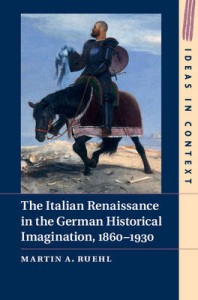Martin A. Ruehl, The Italian Renaissance in the German Historical Imagination, 1860-1930
Martin A. Ruehl, The Italian Renaissance in the German Historical Imagination, 1860-1930, Cambridge, Cambridge University Press, oct. 2015, 341 p., £ 65
Towards the end of the nineteenth century, Germany’s bourgeois elites became enthralled by the civilization of Renaissance Italy. As their own country entered a phase of critical socioeconomic changes, German historians and writers reinvented the Italian Renaissance as the onset of a heroic modernity: a glorious dawn that ushered in an age of secular individualism, imbued with ruthless vitality and a neo-pagan zest for beauty. The Italian Renaissance in the German Historical Imagination is the first comprehensive account of the debates that shaped the German idea of the Renaissance in the seven decades following Jacob Burckhardt’s seminal study of 1860. Based on a wealth of archival material and enhanced by more than a hundred illustrations, it provides a new perspective on the historical thought of Imperial and Weimar Germany and the formation of a concept that is still with us today.
- Analyses the key German texts that shaped the modern concept of the Renaissance
- Adopts an interdisciplinary approach, fusing the methods of intellectual and cultural history
- Examines the idea of the Renaissance in the context of German medievalism and National Protestantism
Table of contents:
1 Introduction: Quattrocento Florence and what it means to be modern
2 Ruthless Renaissance: Burckhardt, Nietzsche, and the violent birth of the modern self
3 Death in Florence: Thomas Mann and the ideologies of Renaissancismus
4 ‘The first modern man on the throne’: Reich, race, and rule in Ernst Kantorowicz’s Frederick the Second
5 The Renaissance reclaimed: Hans Baron’s case for Bürgerhumanismus
6 Conclusion: The waning of the Renaissance – death and afterlife of an idea
